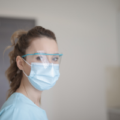CAPA and BOHS welcome IPC and Cabinet Office updated Covid-19 guidance for healthcare settings
The NHS and the wider healthcare system are still in the grips of dealing with the usual winter pressures along with the significant impact of COVID-19, not only on staff sickness levels but also with the ongoing delivery of services to meet the needs of the populations we serve. As a result, the challenges of ensuring the safety and resilience of the NHS and wider workforce along with patient safety are greater than ever, notwithstanding the planned reduction in Covid restrictions announced 19th January.
For the last 16 months the Covid Airborne Protection Alliance (CAPA) has been campaigning to influence IPC Guidance to ensure that all healthcare workers can access the right level of respiratory protective equipment to protect them from Covid-19.
We have worked with the British Medical Association (BMA), Royal College of Nursing (RCN) and the British Occupational Hygiene Society (BOHS) to support consistency of messaging to government, other key stakeholders and our healthcare workforce.
This includes alerting system leaders of the need to meet their legal responsibilities as laid out in the Health and Safety at Work Act 1974 etc for ensuring the safety of the healthcare workforce through the provision of appropriate respiratory protective equipment (RPE).
We have evidence that over 30 NHS Trusts across the UK are now leading the way in how they assess workplace risk and provide staff with appropriate levels of RPE including FFP3.
We are therefore pleased to see that, this week, the Government made important updates to two pieces of guidance which will help to keep healthcare workers, patients and the public safe.
The updated infection prevention control (IPC) guidance:
The Cabinet Office guidance:
Dr Barry Jones, Chair of CAPA said: “I’m delighted that the new IPC guidance makes it clear that healthcare workers can have access to enhanced levels of respiratory protective equipment without being restricted to the current list of aerosol generating procedures (AGPs) which is no longer relevant.
“The IPC guidance however does not specify how COVID-19 is transmitted, placing risk assessment at the mercy of individual employers or managers views or assumptions on this key part of the risk assessment process. We are pleased the Cabinet Office guidance explicitly states that COVID-19 is spread by airborne transmission, close contact via droplets, and via surfaces. Airborne transmission is a very significant way that the virus circulates.”
The Cabinet Office guidance is consistent with other government guidance such as that from the Department for Education (England), Coronavirus (COVID-19) and the use of face coverings in education settings (publishing.service.gov.uk) which highlights that the Scientific Advisory Group for Emergencies (SAGE) has advised that Omicron might show more airborne transmission.
Professor Kevin Bampton, CEO of BOHS added: “System leaders now need to mobilise their health and safety and IPC leads to ensure appropriate risk assessments are carried out and the right level of RPE is provided in a safe and effective manner. This includes ensuring that fit-testing for FFP3 is available, and reusable FFP3 equivalent masks can also be accessed.”
Dr Christine Peters, Consultant Microbiologist Fresh Air NHS, commented: “As SARsCOV 2 transmits by travelling in aerosols produced when breathing, speaking and talking it is crucial that healthcare workers are provided with the correct RPE to ensure protection for them and their patients. We are delighted to see a change in guidance that advocates for this in line with WHO and urge all employers to ensure rapid roll out of respiratory level protection for this airborne infection”.
Notes to Editor
Further details on routes of transmission of Covid-19, risk assessment and different types of RPE can be found on the RCN website
Covid Airborne Protection Alliance (CAPA) includes:
- ARTP – Association for Respiratory Technology & Physiology
- BAPEN – British Association for Parenteral and Enteral Nutrition
- BIASP – British & Irish Association of Stroke Physicians
- BDA – British Dietetic Association
- BSG – British Society of Gastroenterology
- CBS – Confederation of British Surgery
- College of Paramedics
- CSP – Chartered Society of Physiotherapy
- Fresh Air NHS
- GMB Union
- HCSA – Hospital Consultants and Specialists Association
- Medical Supply Drive UK
- NNNG – National Nurses Nutrition Group
- QNI – Queen’s Nursing Institute
- RCSLT – Royal College of Speech and Language Therapists
- Unite the Union
- DAUK- The Doctors Association
- Trident HS&E
BOHS British Occupational Hygiene Society




